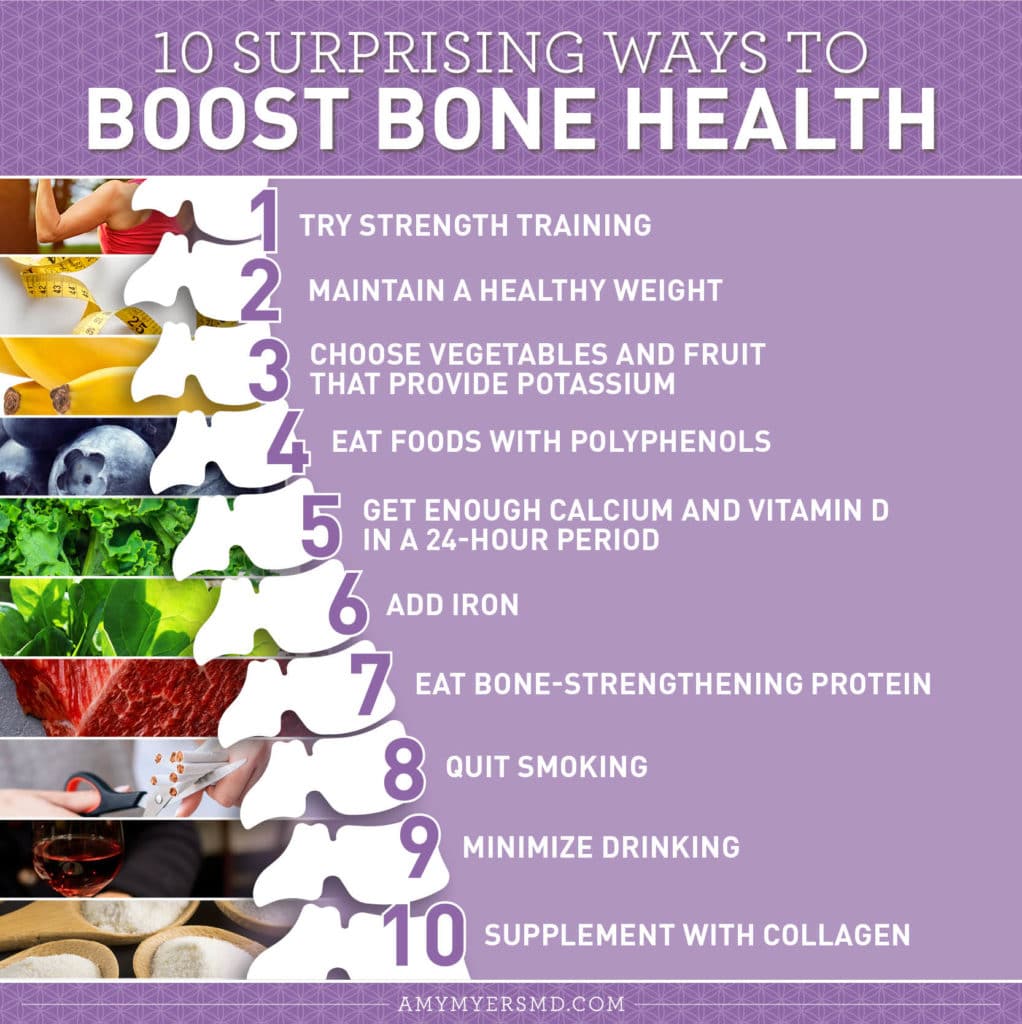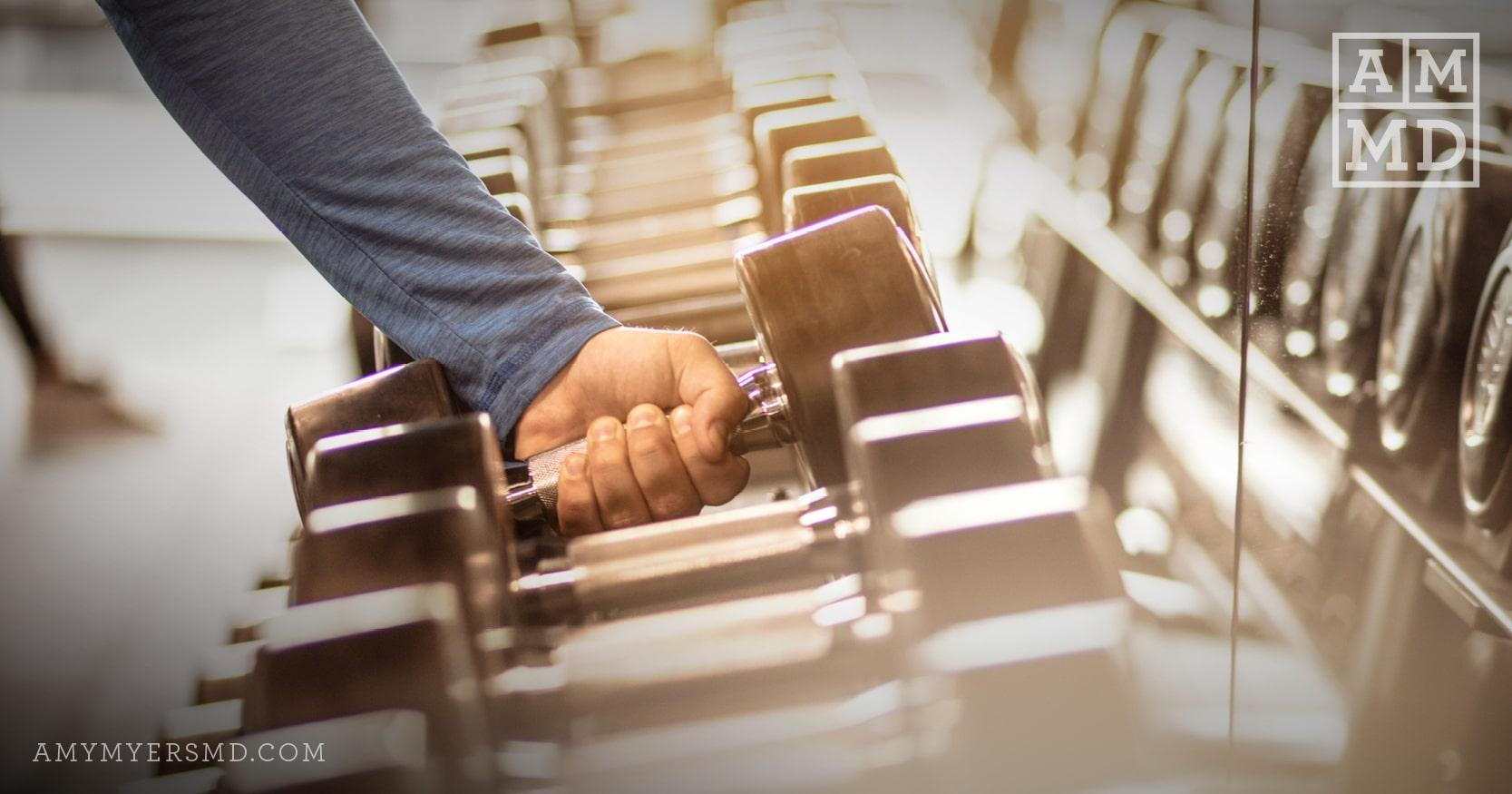Our bones are made of living cells that are constantly growing and repairing themselves, while also communicating with other parts of the body. And collagen is at the core of these amazing structures. That’s why ensuring you have enough in your body (and you can get it with my new Collagen Cookie Dough Bars) is so important.
Let’s take a look at what bones (all 206 of them!) are — their structure, how they function, and what you can do to keep this essential part of your body in tip-top shape. The good news is that you can do quite a bit, because studies show that 40% of bone mass is determined by lifestyle choices.1 You have a lot of control over keeping your bones healthy!
What are Bones Made of?
Bones are made of minerals including calcium, collagen, and a small percentage of water — 25% to be exact. Let’s look at how this protein and mineral interact to give us strong bones, and why we need them both.
Collagen is a protein found throughout your body — in your skin, your digestive system, your connective tissue, and your bones. In fact, collagen provides a soft core to your bones, strengthened by the mineral calcium phosphate which serves to harden the collagen framework. Your bone stores 99% of your body’s calcium and 85% of its phosphorus. Your bones release these minerals as needed to other parts of your body.
The mineral component of calcium is composed of hydroxyapatite, which is an insoluble salt. About 65% of adult bone mass is hydroxyapatite, and small amounts of magnesium, sodium, bicarbonate2, as well as strontium and vanadium. This combination of collagen and calcium makes bones both flexible and strong enough to support weight and not break under stress.
When we lose bone mass as we age, we lose both calcium and collagen. Less bone collagen causes bone fragility, just as calcium loss does. Yet this is not detected by bone density tests, which look only at the mineral content of bone.
Depleted collagen levels in your bones can lead to low-trauma fractures even if there is adequate bone mineral density.3 So, even if you have a good result from a bone density test, diminished collagen levels can compromise your overall bone health.
What is the Function of Bone?
Our bones are as strong as cast iron, yet as light as wood.4 You may take them for granted, however 90% of the world’s animals don’t actually have any bones. So why do we have them?
We, like all other mammals, have a spinal cord where our nerves collect information en route to the master controller, the brain. Our bones also provide protection and structure for our bodies.5
In our youth, our bones are firm yet somewhat flexible. This flexibility in bones actually provides their strength. However, bones become more brittle as we mature, and break much more easily than flexible bone. This condition is called osteoporosis, or “porous bone.”
This bone loss occurs gradually, often with no symptoms until a fracture occurs.6 With age, our healing processes also slow, so if you damage a bone, it takes longer to heal than it did when you were a kid. This is yet another reason why you want strong bones.
Fortunately, there are many ways to boost bone health and stave off the risks of osteoporosis and bone loss. You can add dietary collagen to boost bone health in addition to any osteoporosis treatment such as medications like denosumab (Prolia®) that your doctor may prescribe. To ensure bone health over the long term, make sure you get adequate collagen in your diet starting now with sources such as Collagen Cookie Dough Bars.
Let’s look at what the structure is of bones themselves. Your skeleton (that’s all your bones combined) does nothing less than support all of your bodily systems and organs necessary for life. It provides support, protection, movement, blood cell formation, and storage for important minerals.
- Support: Your skeleton provides a strong support system, like a scaffold, for virtually your entire body including your heart, lungs, and marrow. Bones also allow your body to keep its shape and to stand upright.
- Protection: Bones form a strong, protective layer around many of your organs, keeping them safe in the event of a fall, for example. Your rib cage shields important organs such as your lungs and heart. The hip bones protect the uterus in women. Your brain is protected by the thick bone of your skull.
- Movement: Your bones connect to each other by six different types of synovial joints including the pivot, hinge, saddle, plane, condyloid, and ball-and-socket. Your joints are linked to your muscles and ligaments to provide mobility to all your limbs.
How Can You Increase Bone Health?
There are many steps you can take to ensure your bones keep the necessary levels of calcium and collagen throughout your life. Dietary and lifestyle adjustments can ensure you minimize your risk factors so you don’t suffer from osteoporosis or brittle bone disease as you age. Here are 10 tips to help you maintain bone health.
 Dr. Amy Myers
April 13th, 2020
https://content.amymyersmd.com/article/boost-bone-health/10 Surprising Ways To Boost Bone Health – Infographic – Amy Myers MD®
Dr. Amy Myers
April 13th, 2020
https://content.amymyersmd.com/article/boost-bone-health/10 Surprising Ways To Boost Bone Health – Infographic – Amy Myers MD®1. Try strength training.
Strength training, or weight-bearing exercise, improves bone density by putting stress on bones. The heavier the weight the greater the results. High repetitions of lower weights are also effective at strengthening bone mass.7 Even body-weight exercises including push-ups and walking help maintain your bones.8
2. Maintain a healthy weight.
Being too thin is bad for your bones. In women especially, extreme weight loss or a very low body weight can cause estrogen levels to drop enough to negatively impact bone health.9 Recent research suggests obesity may also negatively impact bone mass.10
3. Choose vegetables and fruit that provide potassium.
Potassium may neutralize acids that remove calcium from the body, protecting bone density.11 Good sources include banana, avocado, and spinach.
4. Eat foods with polyphenols.
Polyphenols reduce oxidative stress because they act as antioxidants and reduce inflammation, helping prevent and treat osteoporosis.12 Good sources of polyphenols include dark berries, olives, nuts, spices such as ginger and cumin and my Organic Greens powder, which makes a delicious green juice.
5. Get enough calcium and vitamin D in a 24-hour period.
Calcium-rich foods include dairy products, which I suggest you avoid, so opt for kale and sardines, or try a supplement that includes a bioavailable form of calcium. Calcium needs a myriad of vitamins and nutrients to survive the hard trip through your arteries and make it safely to your bones, where it can begin the critical task of supporting bone strength and flexibility.
I recommend my OsteoDura™ full-spectrum bone-health formula, which contains all the essential nutrients required to support optimal bone mineral density, strength, and flexibility.
OsteoDura™ is made with calcium sourced from bioavailable Aquamin® TG Sea Minerals, vitamin D3, magnesium, and vitamins K1 + K2 to ensure you get a highly-bioavailable, organic-form calcium bone supplement.
6. Add iron.
Getting enough iron also helps promote bone health. Iron helps make red blood cells which produce collagen. Good sources of iron include spinach, kale, oysters, and liver.
7. Eat bone-strengthening protein.
Eat your meat to ensure better bone health! We need protein to build strong bones. Good sources of protein include organic meat, nuts, eggs, and fatty fish such as wild-caught salmon.
8. Quit smoking.
We know smoking is unhealthy, but did you know it leads to bone loss? Nicotine blocks osteoblasts which build bone tissue. So, quit smoking as soon as possible.
9. Minimize drinking.
Alcohol makes the parathyroid hormone, which leeches calcium from your bones. It also boosts cortisol which decreases bone formation and increases bone breakdown, so skip happy hour to support your bone health.
10. Supplement with Collagen.
Collagen is the protein amino acid matrix upon which your bones are built so ensuring an adequate intake of collagen is critical to maintaining bone health. If you prefer something savory, you can enjoy the health benefits of bone broth with my Collagen Bone Broth to increase your collagen intake. If you have a sweet tooth, my Collagen Cookie Dough Bars are a great way to ensure you get 11 grams of collagen!
Bone loss is silent and occurs gradually with little to no obvious side effects — until you get a broken bone! Be proactive and implement these 10 tips to ensure you reduce the risk of osteoporosis or brittle bone disease.
My Collagen Cookie Dough Bars are an easy and delicious way to ensure you’re getting plenty of collagen for healthy bones (and your hair, skin, and nails will thank you too!) Our bones are the unsung heroes of optimal health in our bodies. They support us, protect us, and provide a storehouse for nutrients. Take good care of your bones and they will continue to take care of you!

Article Sources
- https://www.ncbi.nlm.nih.gov/pmc/articles/PMC3650509/.
- https://depts.washington.edu/bonebio/ASBMRed/structure.html.
- https://www.betterbones.com/bone-health-basics/collagen-for-osteoporosis.
- https://www.aoa.org.au/for-patients/wonder-of-movement/bones.
- //www.bbc.com/earth/story/20160812-why-we-have-a-spine-when-over-90-of-animals-dont.
- //www.bbc.com/earth/story/20160812-why-we-have-a-spine-when-over-90-of-animals-dont.
- https://www.berkeleywellness.com/fitness/exercise/article/lift-lighter-weights-stronger-bones.
- https://newsnetwork.mayoclinic.org/discussion/womens-wellness-bone-density-in-women.
- https://www.ncbi.nlm.nih.gov/pmc/articles/PMC3583521/.
- https://www.ncbi.nlm.nih.gov/pmc/articles/PMC1868430/.
- https://www.ncbi.nlm.nih.gov/pmc/articles/PMC3650509/#bib1.
- https://www.sciencedirect.com/science/article/abs/pii/S0963996915302234.
